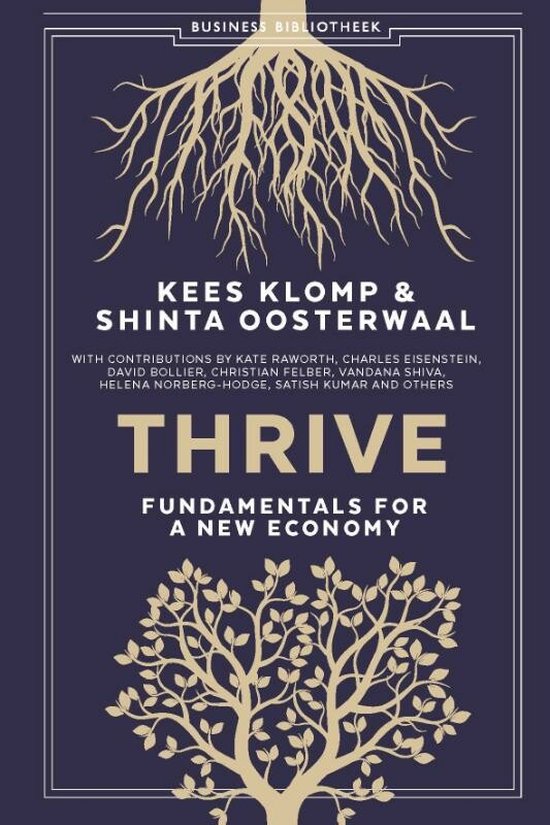Business Contact 2021, 428 pagina's - € 27,99
Met bijdragen van o.a. Charles Eisenstein, Klaas van Egmond, Kate Raworth en Hans Stegeman.
Engelstalig
Korte bio Kees Plomp (1968) en Shinta Oosterwaal (1980)
Korte beschrijving
Tekst op website uitgever
In ‘Thrive. Fundamentals for a New Economy’, Kees Klomp and Shinta Oosterwaal provide insights into alternative approaches to economics that are sustainable and just for both society and the planet in the long term. In twenty-four essays, internationally renowned economic thinkers like Kate Raworth, Charles Eisenstein, Clair Brown, Helena Norberg-Hodge and Daniel C. Wahl, share the alternatives that are available to us, such as doughnut economics, wellbeing economics, common good economics, regenerative economics, buddhist economics, commons economics, local economics, bioregional economics, indigenous economics and degrowth economics. Each of these approaches provides a realistic and enticing vision of a thriving future. ‘Thrive’ offers readers the fundamentals for a new economy that is rooted in the well-being of humanity and of our planet. This book is a must-read for anyone in search of economic perspectives that contribute to a flourishing world.
Fragment uit Voorwoord - door Jeremy Lent
It was four decades ago that Margaret Thatcher famously brushed aside any criticism of the neoliberal ideology taking over the world with her trademark phrase “There is no alternative.” Since then, regulations have been shredded across the globe, billions of people have been left malnourished while mega-billionaires vie for planetary domination, profit-seeking corporations have surpassed nation states as the largest economies, animal populations worldwide have been slashed to less than a third of what they were, and our civilization faces the existential crisis of climate breakdown.
And still, most people—even those concerned about the dire state of the world—organize their activities around the implicit acceptance of Thatcher’s declaration. The only way for society to be structured, it is assumed, is in the form of growth-based consumer capitalism—a system in which corporate profits ultimately drive the decisions that affect the lives of everyone on the planet, the health of the living Earth, and the destiny of future generations. Virtually all policy proposals under serious consideration to fix our grave problems work within the framework of the current system rather than examining the system itself.
There is, however, an alternative. Everywhere, in communities across the world, people are working together as part of a global transformation toward a life-affirming future. In many cases, they may not be fully conscious of the great movement in which they’re participating, but they’re driven by core human imperatives to care for others around them, nurture the living Earth, and strive to leave a healthy world for future generations to inherit.
Increasingly, people are putting a name on this global movement that is perhaps the greatest collaborative human project in history: the transition toward an ecological civilization. Our current global civilization has been built upon conceptual foundations of domination laid down over the past few millennia. Growth-based neoliberal capitalism is the ultimate manifestation of a worldview founded on separation: seeing individuals as separate from others around them and humans as separate from the rest of life on Earth. This sense of separation leads to an extractive mindset where people and other sentient beings are viewed as mere resources for exploitation. An ecological civilization, by contrast, represents a fundamentally different form of organizing society: a civilization based on principles that undergird the health and resilience of natural ecosystems, with the overriding objective to create the conditions for all humans to flourish as part of a thriving Earth.
An ecological civilization encompasses virtually every aspect of human experience: culture, values, education, technology, and just about every other domain of human society. Fundamental, however, to any civilization is the way in which people organize their economic activities. The market orientation of our current neoliberal model has infiltrated nearly every aspect of life, corroding the dignity inherent to normal human activities along with it. One of the most crucial changes required to achieve an ecological civilization is a transformation of economics—redefining it in terms of life-sustaining principles rather than merely as an algorithm for maximizing wealth accumulation.
This book provides an invaluable service to this process of transformation by bringing together the brilliant ideas of many of the leading visionaries who, collectively, are laying down pathways toward the economics of an ecological civilization. The contributors to this book comprise what amounts to a brain trust for the flourishing of future generations. They are pioneers in multiple fields of inquiry and engagement, ranging from academic to spiritual, and from rassroots activism to international policymaking.
Together, the ideas presented in this book offer a rich palette of options for redesigning the field of economics from the ground up, basing it on a solid and integrated platform of core human values. In these pages, you will discover a full-blown reassessment of economics, all the way from theory to practice. You will learn about the faulty foundations of mainstream economic theory and are invited to explore fundamentally different foundations, incorporating a deep cosmological recognition of interconnectedness and leading to a new paradigm that upholds morality and wellbeing as paramount. (pagina 9-10)
Artikel: De nieuwe economie: van circulair tot heilig (FD, 23 oktober 2021)

Geen opmerkingen:
Een reactie posten
De redactie behoudt zich het recht voor reacties te verwijderen